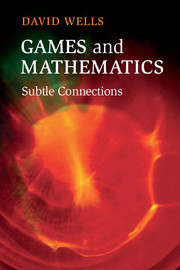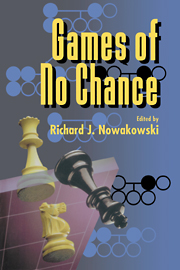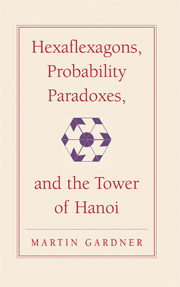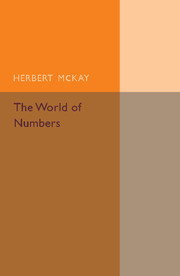Games and Mathematics
The appeal of games and puzzles is timeless and universal. In this unique book, David Wells explores the fascinating connections between games and mathematics, proving that mathematics is not just about tedious calculation but imagination, insight and intuition. The first part of the book introduces games, puzzles and mathematical recreations, including knight tours on a chessboard. The second part explains how thinking about playing games can mirror the thinking of a mathematician, using scientific investigation, tactics and strategy, and sharp observation. Finally the author considers game-like features found in a wide range of human behaviours, illuminating the role of mathematics and helping to explain why it exists at all. This thought-provoking book is perfect for anyone with a thirst for mathematics and its hidden beauty; a good high school grounding in mathematics is all the background that is required, and the puzzles and games will suit pupils from 14 years.
- Discover fascinating connections between games and mathematics
- Gives a unique insight into what mathematics is all about
- Mathematical puzzles and problems suit students from 14 years and beyond
Reviews & endorsements
"One of the wellsprings out of which the discipline of mathematics has developed is human delight in intellectual play, manifest in the ubiquity of abstract games across millennia and cultures. The author of this fascinating book is expert in both domains, and in the art of clearly explaining significant aspects of mathematics in ways both accessible to non-experts and illuminating to experts. Through a delightfully rich variety of historical and multicultural examples, he unveils the intimate relationship between abstract games and mathematics as the study of structures, and, in so doing, illuminates much more about mathematical behavior and cognition. At a time when too much of mathematics education in school seems designed to squeeze out every last drop of playfulness, we are reminded that mathematics can, and should, be an intellectual playground."
Brian Greer, Portland State University
"This is a very approachable yet erudite book. Wells' game is to turn Plato's theory of forms on its head: instead of starting with physical examples and imagining their ideal forms, we should take our cue from the abstract laws and intuitions of games. Chess pieces are defined by their powers rather than their physical forms, and so are many situations in mathematics.
The book illustrates this thesis with fascinating context: from Ulam's "lucky" numbers which share many of the qualities of primes, to the symmetry of the theorem discovered by Emperor Napoleon and the mathematics which arises in Go, Hex and chess.
Wells notes that mathematicians use analogy and other play techniques as they construct proof. He draws the reader to a new appreciation of proof – not mere certification of correctness but a deeper exploration of the mathematical world.
Games and Mathematics makes an important advance in communicating the nature of mathematics. It contains a profound message for philosophers of mathematics, but all mathematically-inclined readers will find Games and Mathematics as compelling as Wells' excellent “Curious and Interesting” books."
Dr. Paul Brown, Carmel School, Perth, Western Australia
Author of Proof: Interesting Activities in Conjecture and Mathematical Proof
"This is no ordinary compilation of recreational problems in mathematics, it differs
from the usual ones in several aspects.
1. The author makes a well argued philosophical point about mathematics and games, what they have in common and in what they differ.
2. The problems are chosen to illustrate his philosophical ideas and although overlaps with standard examples are inevitable the author has gone out of his way to seek out original and striking problems, whose interest goes beyond the merely curious or recreational. In his selection he shows exquisite mathematical taste, and even as a professional mathematician I found several of his examples eye-openers.
3. In addition to his general philosophical framework he presents insightful comments on what it means to be a mathematician, how mathematical taste can differ and the crucial, if elusive. notion of mathematical beauty being an integral part of any true mathematical activity.
4. Finally his presentation displays erudition, with many examples ranging over cultures and historical epochs.
In addition I would say that the text reads well and is something of a page-turner. As noted this is not a mere compilation of problems, but a guided tour, and one would hope that it would reach a wider audience, so the authors expressed intention, of showing that mathematics is not merely computation, but actually foremost an imaginative play, should become effective. The only criticism I would make is that many of the figures the author has drawn are substandard and do not measure up to the standards of the text. I believe that CUP will remedy this and in general design a lay-out that the text deserves. All in all this could be a delightful volume in every aspect and I find myself recommending the work, if such are the expectations, with warmth and enthusiasm and with no qualms."
Ulf Persson, Chalmers University of Technology, Gothenburg
"Complete with a consistent argument and a wealth of supportive references, this is a fun work for both game players and mathematicians to explore. Highly recommended."
J. Johnson, Western Washington University for Choice Magazine
Product details
October 2012Hardback
9781107024601
258 pages
235 × 158 × 19 mm
0.53kg
160 b/w illus.
Available
Table of Contents
- Introduction
- Part I. Mathematical recreations and abstract games:
- 1. Recreations from Euler to Lucas
- 2. Four abstract games
- 3. Mathematics and games: mysterious connections
- 4. Why chess is not mathematics
- 5. Proving versus checking
- Part II. Mathematics: game-like, scientific and perceptual:
- 6. Game-like mathematics
- 7. Euclid and the rules of his geometrical game
- 8. New concepts and new objects
- 9. Convergent and divergent series
- 10. Mathematics becomes game-like
- 11. Maths as science
- 12. Numbers and sequences
- 13. Computers and mathematics
- 14. Mathematics and the sciences
- 15. Minimum paths from Heron to Feynmann
- 16. The foundations: perception, imagination and insight
- 17. Structure
- 18. Hidden structure, common structure
- 19. Mathematics and beauty
- 20. Origins: formality in the everyday world
- Bibliography
- Index.





